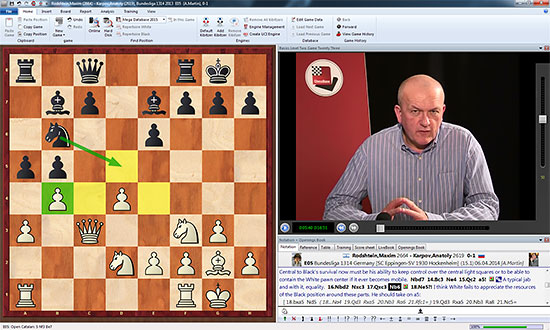


ChessBase 17 - Mega package - Edition 2024
It is the program of choice for anyone who loves the game and wants to know more about it. Start your personal success story with ChessBase and enjoy the game even more.
This is version 2.0, or the second edition of The Basics of Winning Chess, a DVD that IM Andrew Martin released just ten years before, but that after consideration warrants a revised and updated edition. The overall level of play never stops increasing and when playing, there are few things, if any, that are more frustrating than botching a winning position. There isn't a player that does not go through it, but just like watching Fred Astaire dance, the champions often make it seem almost effortless.
Nevertheless, technique is not a simple term that applies to a clear-cut body of knowledge, such as endgames, tactics, or other, but rather it is the sum of all the parts that allow more and more winning positions to be converted confidently into a full point.
Since it is obvious players of different levels will have different needs, the author divides the levels of lessons into three sections. The first, to illustrate, is for the rank beginner, a player who has mastered the rules of the game, and possibly some basic mates such as King and Queen versus King, or King and Rook versus king. Where should the student start?
Martin's vast experience as a teacher and coach shows here as he proposes to keep it simple and objective. "What are the ideas which will help them to progress?" he asks.
"At this level we keep it uncomplicated:

The DVD is not lacking material for the student or the teacher, and contains over six hours of videos
Though often credited to Capablanca, for his example of having started chess with a book on endgames that he studied as a child, Andrew Martin agrees that before juggling ten balls, one should start with fewer, and likewise the endgame should take precedence with a few basics to know what to do if all the pieces come off the board. He discusses basic king and pawn endgames, to the fundamentals behind king, rook and pawn, versus king and rook.
A sample lecture discussing basic endgames for lower-rated players and training ideas
Likewise he presents the ideas of tactics, with an illustrative game, but does not propose to teach the entire gamut of tactics. This is quite understandable since the topic is vast, and would be outside the scope of the DVD in question.
Level two already takes the ball forward, and the first steps in strategy are laid forth for the student to consider and develop, or the teacher to use as groundwork for his classes. Time, space, pawns and pawn structure are all discussed, though I preferred the lectures at the end, notably a game between Rodshtein and Karpov from 2014. In it, Martin discusses the ideas by coach and grandmaster, Jacob Aagard from his book, "Positional Play", highlighting the concept of asking oneself questions throughout the game. Not just any question of course, but specific ones that help find the root of the position and how to proceed.

Discussing the idea of asking questions, the right questions, during a game to uncover the plan
Finally the third level is broached, described simply as "the expert level". This particular part is what Andrew Martin singles out as the key reason for revisiting this DVD and updating it. As he explains, "There are remarkable differences between the way chess is played in 2014 and even what it was like ten years ago, when I made the first recording."
What are those differences? In the author's point of view: "I will now identify the key elements which I think come together to make a successful master chess player in 2014
Obviously these aren't necessarily new points that appeared out of nowhere and did not exist before, but he feels these have now become far more significant, especially thanks to modern software and engines. The lectures that follow form the largest part of the DVD, and illustrate Martin's points to perfection.

Martin's enthusiasm for the material is visible, and it rubs off on the viewer
The idea of a DVD discussing technique at various levels of a chess player's development is obviously slightly unusual, in that his one starts quite literally at the rank beginner level, and then finishes on what can only be described as players over 2000 Elo. For the beginners, many of the concepts are taught outright in the DVD, such as the endgames, but other points are discussed and illustrated, but require the student (or teacher) to seek out specialized material on their own.
It is therefore important to understand the DVD will not teach you winning technique in and of itself, but rather guide you by teaching you what to seek out, and why, so that you need never feel rudderless, unsure how to take your game, or your student's game, to the next level. In this understanding, I feel Andrew Martin was successful in explaining the reasons for his choices, with well-chosen examples. Instructors will also find extra study material to help teach their lower-level pupils.
Click here to order Basics of Winning Chess 2.0 in the ChessBase Shop